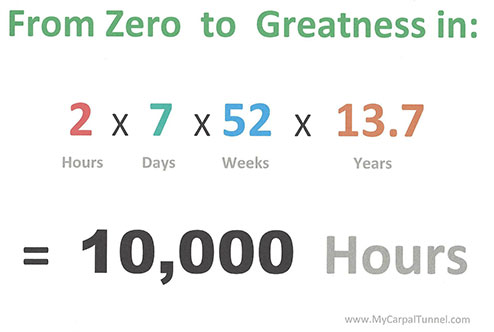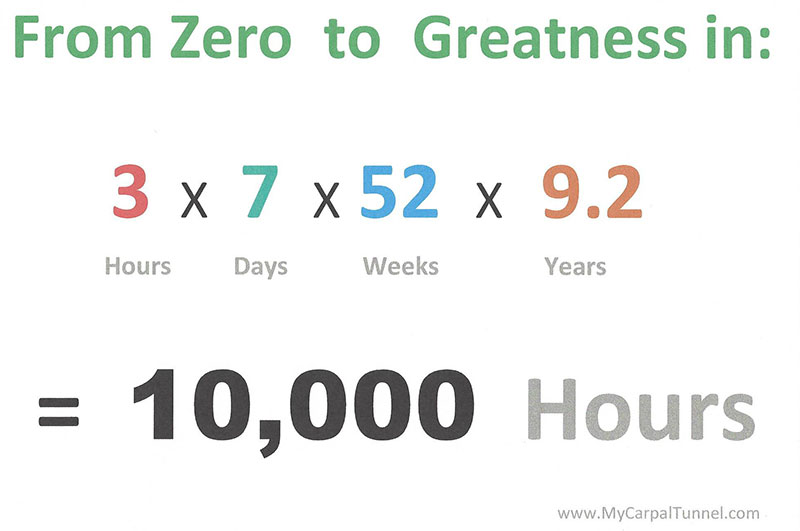Violinists Prevent Carpal Tunnel Syndrome, In Route to 10,000 Hours

Just before the turn of the century a team of psychologists in Berlin, Germany studied a group of promising young violinists. They studied their approach to practice in childhood, adolescence, and adulthood. Each of the Violinists were asked a question: “Over the course of your entire career, ever since you first picked up the violin, how many hours have you practiced?”
All of them had begun playing at roughly five years of age with similar practice times in the beginning. However, by age eight, practice times began to diverge from one another. By age twenty, the elite performers had stacked up an average of more than 10,000 hours of practice each, while the less proficient in the group had an average of only about 4,000 hours of accumulated practice.
The elite had more than double the practice hours of the less able violinists.
How Committed Are You To Become Great?
You have to love what you do.

One fascinating aspect of the Berlin Violinist Study:
No “naturally gifted” performers emerged.
If natural talent had played a role, we would expect some of the “naturals” to gravitate to the top of the elite level with fewer practice hours than the other elite Violinists.
But the data showed this was not the case. The psychologists found a direct statistical relationship between hours of practice and musical achievement. While in the early stages of development natural talent might result in faster progression, in the end, there are no shortcuts to elite performance. There are no “naturals” at the elite level. Passion for what you do and a willingness to put in the hours of practice drives elite performance.
“Natural Talent” Has No Impact On Results at the Elite Level.
Carpal Tunnel is a Common Obstacle to Elite Performance for Violinists

There are many obstacles to elite performance. One of the common pitfalls for violinist striving for elite ability is Carpal Tunnel Syndrome. The repetitive stress of playing for 2 – 3 hours each day, day after day can accumulate. Fatigued soft tissue, becomes injured, loses it flexibility and generates swelling in and around the Carpal Tunnel at the base of the hand. Pressure builds up from contracting soft tissue that has lost its flexibility and from swelling. The pressure pinches the Nerve in the tight Carpal Tunnel space creating symptoms of hand numbness, hand pain, tingling fingers and the loss of sensitivity in the finger tips and loss of fine motor skills. The ability to perform the intricate hand and finger moves needed to play the violin is lost.

So what happens when you have invested 8,000 hours and you start to lose your hand grip strength?
Or, you have invested the 10,000 hours and you are performing at an elite level and your career is taking off and symptoms like hand numbness, wrist pain, hand pain and lack of feeling in your fingertips start to happen? It can be depressing and devastating to have invested all that effort only to be sidelined by Carpal Tunnel Syndrome and not be able to perform.
What can be done to stay on track for elite musical performance?
Click Here for: 10 Tips for Musicians to Keep Their Hands Healthy:

Then I gathered myself together and remembered, I did not come this far to quit or get derailed by Carpal Tunnel Syndrome. So, I went online and did some research. I was determined to find the answer. I learned one thing for sure: Surgery was a last resort and could end my career. I found some stretches on YouTube that were helpful.
But the most important thing I found was this night time stretching treatment that was developed by Doctors called the Carpal Solution. I ordered it and thankfully it arrived quickly. I started the 6 week treatment and within a few days, my hands and wrists were feeling better. I decided to do some longer prep sessions to see if it would get worse. I just keep getting better. Within 4 weeks my hands were almost better. After six weeks I could play as long as I wanted without worry and without pain.
The Carpal Solution Night Time Stretching Program is my go to treatment for Carpal Tunnel. No lie, it saved my music career!”
Jake
Nashville, Tennessee

